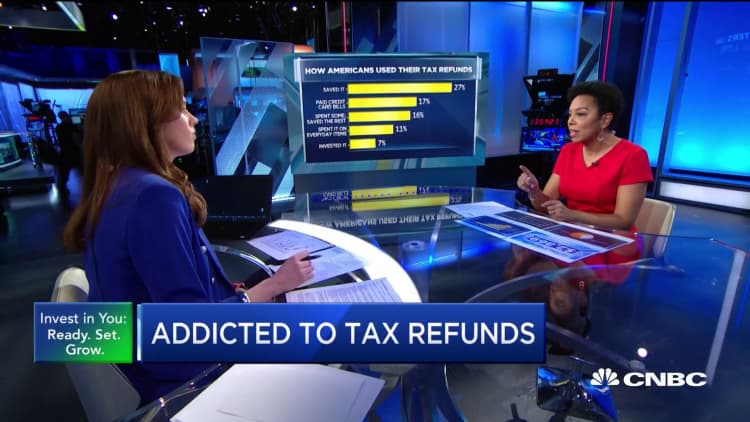Just because you're due a tax refund, it doesn't necessarily mean you'll get it.
As we approach the middle of tax season, the IRS has been doling out money to those who overpaid. The federal agency has issued 37.5 million refunds, with checks averaging $3,125, according to IRS data for the week ending Feb. 21.
In some cases, the Treasury Department can head off that deposit before it ever hits your checking account.
"The federal government has the Treasury Offset Program, which allows state and federal government agencies to collect outstanding debt owed to them by offsetting it from a tax refund," said Susan Allen, CPA and senior manager for tax practice and ethics at the American Institute of CPAs.

During the 2019 fiscal year, the program collected $9.3 billion in so-called offsets for federal and state agencies.
The Treasury Offset Program not only plucks dollars from income tax refunds, it also siphons off cash from Social Security to cover delinquencies.
If Uncle Sam grabs your check, you'll know it.
It generally takes the IRS fewer than 21 days to issue most refunds. You'll get an offset notice in the mail from the federal government if your refund is being applied elsewhere.
Here are four scenarios in which you could lose your money.
Back taxes

If you owe the federal government or your state back taxes from prior years, then a portion or the entirety of your refund check will go toward it.
The IRS will contact you if your refund is being clawed back to address past federal liabilities. Other offsets, including amounts owed to your state, will cue a notice from the Treasury Department's Bureau of the Fiscal Service.
Federal loan default
If you took a federal loan to go to college, buy a house or start a business, your tax refund is at risk if you fail to make timely payments.
For instance, borrowers who don't make payments for at least 270 days on their student loans are considered in default.
The pain doesn't stop there. Federal agencies that offer loans can also take a bite out of your wages if you fall behind.
Missed alimony or child support payments
The federal government doesn't look kindly upon deadbeats.
If you're delinquent on child support or alimony, your state can refer the matter to the IRS and the state's tax agency for payment through a refund offset.
In fiscal year 2019, the federal government collected $1.7 billion in offsets related to missed child support, according to the Treasury.
Overpaid unemployment benefits
If you took unemployment insurance benefits that you weren't entitled to — perhaps because you made a mistake when claiming benefits or because you failed to complete work search requirements — you could lose some or all of your tax refund.
In this case, your state would work with the federal government to seize your check.
The Treasury nabbed $273 million in offsets during the 2019 fiscal year stemming from unemployment compensation.
More from Smart Tax Planning:
How to maximize traditional and Roth retirement savings
Some weird tax breaks have become harder to claim
Got a student loan? Don't forget this tax break





